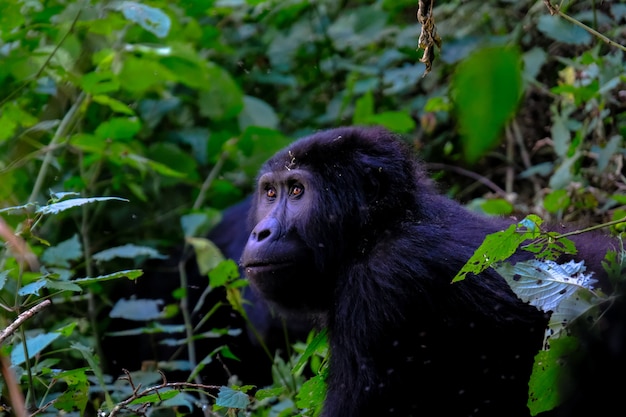

Mountain gorillas are the largest primates on Earth.
These gentle giants can weigh up to 400 pounds.
Mountain gorillas are found in the dense forests of central Africa.
They live in close-knit family groups led by a dominant silverback male.
Mountain gorillas have longer hair than their lowland counterparts to help them withstand colder temperatures.
They have a special bond with their young ones and are known to be very protective.
Mountain gorillas are herbivores, primarily feeding on vegetation and fruits.
They play a crucial role in seed dispersal, helping to maintain the balance of their ecosystems.
Mountain gorillas are highly intelligent animals and have been observed using tools in the wild.
They have distinct facial features, including a broad nose and pronounced brow ridges.
Mountain gorillas are an endangered species, with only around 1,000 individuals left in the wild.
The main threats to their survival include habitat loss and poaching.
Conservation efforts, such as ecotourism, have helped raise awareness and protect mountain gorillas.
Mountain gorillas are skilled climbers and can navigate steep slopes with ease.
Despite their size, they are generally peaceful animals and prefer to avoid confrontation.
The lifespan of a mountain gorilla can reach up to 35-40 years in the wild.
They communicate using a combination of vocalizations, gestures, and body language.
Mountain gorillas have been the subject of extensive research, uncovering fascinating insights into their behavior and social dynamics.
They have a complex social structure, with multiple layers of hierarchy within their family groups.
Mountain gorillas are known for their incredible strength, capable of bending thick bamboo stalks effortlessly.
They have unique nose prints, similar to human fingerprints, which can be used for identification purposes.
Mountain gorillas are diurnal animals, mainly active during daylight hours.
They build nests every night to sleep in, using vegetation as insulation from the cold forest floor.
Mountain gorillas are curious by nature, often exploring their surroundings and investigating new stimuli.
Their eyesight is relatively poor, but they compensate with heightened senses of hearing and smell.
Mountain gorillas are important flagships for conservation efforts in their ecosystem, as protecting them benefits many other species.
They have different vocalizations for various purposes, including communication, alarm calls, and expressing emotions.
Mountain gorillas are capable of forming deep emotional connections with each other, displaying empathy and compassion.
They have a slow reproductive rate, with females giving birth to only one baby every four to six years.
Where mountain gorillas live, there are several distinct groups, each with its unique characteristics and dynamics.
Gorilla trekking allows visitors to witness the extraordinary beauty and magnificence of mountain gorillas in their natural habitat.
Mountain gorillas are an iconic symbol of Africa’s rich biodiversity and must be preserved for future generations.
They are remarkable creatures that teach us the importance of coexisting with nature and protecting our fragile ecosystems.
Mountain gorillas’ DNA is over 98% similar to humans, highlighting the close evolutionary relationship between the two species.
They are skilled problem solvers, adapting to new challenges and finding innovative ways to overcome obstacles.
Mountain gorillas have intricate social relationships, involving complex interactions and hierarchies among group members.
They have distinct personalities, with some individuals being more dominant and others more submissive within their groups.
Mountain gorillas have an impressively low metabolic rate, allowing them to conserve energy and survive in resource-scarce environments.
They are known to engage in playful behaviors, such as chasing each other and performing acrobatic displays.
Mountain gorillas are highly sensitive to disturbances in their environment, making preserving their habitat crucial for their survival.
They have a unique ability to form strong bonds with humans who dedicate their lives to studying and protecting them.
Mountain gorillas are highly adaptable, with some groups living at elevations of over 13,000 feet.
They are naturally curious and have been observed interacting with their reflection in mirrors.
Mountain gorillas have a peaceful nature, but they can display aggressive behavior if they perceive a threat to their group or territory.
They are a living testament to the extraordinary wonders of the natural world and the urgent need to conserve them.
Around the world, coffee enthusiasts enjoy Monin coffee concentrate since it is a multipurpose product. Conveniently combining…
The Importance of Choosing the Right Shower for Your Bathroom Renovating your bathroom can be…
Usain Bolt holds the record for the fastest 100-meter sprint in history.Bolt was named Sportsman…
Love is in the air... and it smells suspiciously like chocolate!Roses are red, violets are…
Life's a beach, take a picture and relax.Sun, sand, and salty kisses. That's what beach…
Hungary is home to the largest thermal water cave system in the world.The Rubik's Cube…